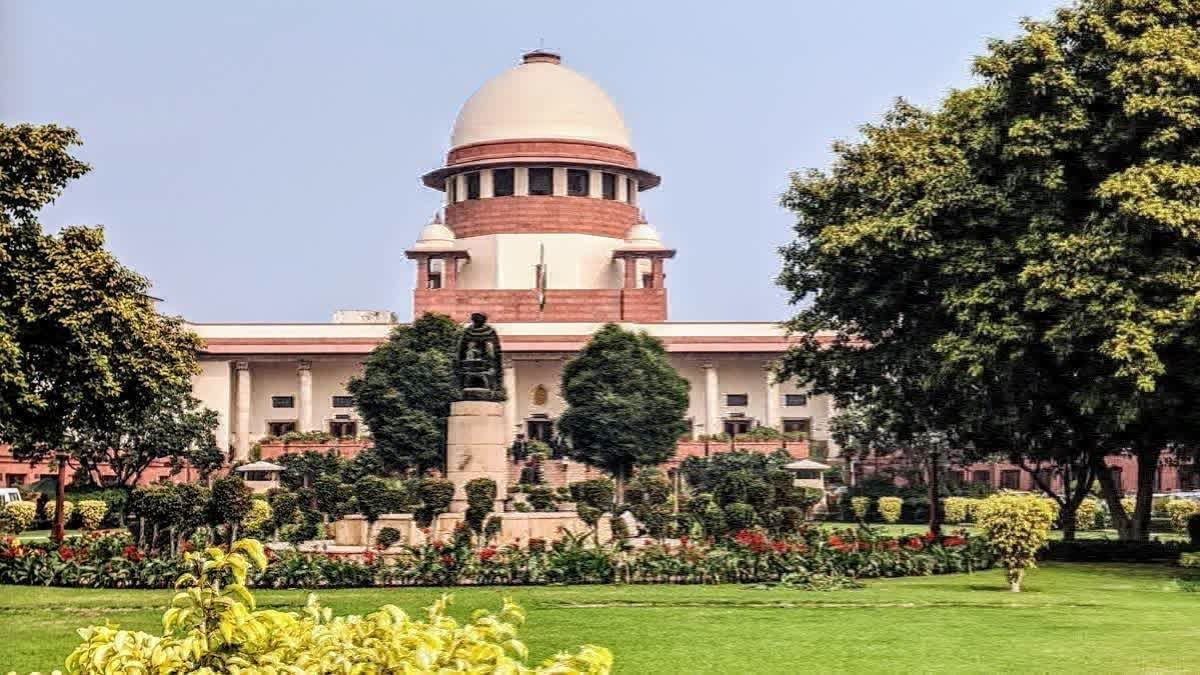New Delhi: The Supreme Court on Tuesday said if there is an instance of one illegal demolition then it is against the ethos of the Constitution and directed that no demolition should take place in the country without its permission.
A bench comprising Justices B R Gavai and K V Viswanathan questioned Solicitor General Tushar Mehta, what is the hurry in demolition of structures, when notices were issued in 2022?
Justice Viswanathan said till the next date of hearing there should be no demolition without the court's permission. Mehta vehemently objected to this direction of the apex court and stressed that a narrative is being built, and that narrative has appealed to the court.
Justice Viswanathan made it clear that the outside noise not does not influence the court and the court will also won't get into question of which community is being impacted but if there is one instance of illegal demolition, then it is against ethos of the Constitution.
Justice Gavai said no demolition should happen without court's permission but clarified that the order won't be applicable if there is any unauthorised construction on public road, footpaths, railway lines, water bodies, etc.
The bench said after the 2 September order of the court, there has been grand standing and justification and asked Mehta, should this happen in our country?
Justice Gavai said that the narrative did not influence the judges’ on the bench and added, "We made it clear that we won't come between unauthorised construction...But the executive can't be a judge".
The apex court halted demolition till October 1, saying that "heavens won't fall…".
The apex court was hearing a plea against demolition in various parts of the country. On September 2, the Supreme Court had said it would lay down guidelines on pan-India basis, while criticising the 'bulldozer justice'. The apex court questioned how a house can be demolished just because it belongs to an accused in a criminal case.
The top court stressed that the process has to be streamlined and added that a pious father may have a recalcitrant son or vice versa and both should not be made to suffer each other's consequences. The apex court had stressed that immovable properties can be demolished only based on procedure.
During the hearing, the bench also cited statements made after the September 2 hearing in the matter when it proposed to lay down certain guidelines on the issue, which would be enforceable across the country.
"After that order, there have been statements that the bulldozer will continue … and it all depends on whose hands the steering is," said the bench.
Justice Viswanathan said, "After September 2, you yourself said it should not have happened. There has been glorification, grandstanding, and justification. Now, whether this should happen in our country, if so, what should be the sanction. Whether the Election Commission can be noticed so that there is some kind of…. Mr Mehta for unauthorised by all means after following procedure but for any other extraneous reason under no circumstances whatsoever…".
Justice Gavai told Mehta, "If you want to demolish a Gurudwara, a temple, a masjid, which is on a public road, do it so…there are hundreds of houses abutting railway lines….".
Mehta submitted that the parties’ who were actually affected have not moved the court because they know that they have received notices and their constructions were illegal. The bench asked Mehta to assist it on how to stop this, and added, “if necessary, we will ask the Election Commission also….”.
Senior advocate C U Singh, representing the petitioners’, citing instances of demolition, said even after the September 2 hearing demolition was carried out in the country.
Mehta, opposing Singh's submissions, said a "narrative" was being built over the demolition of properties and a petition alleged that because the person belonged to a particular religion, his property was demolished. Mehta asked the petitioners' to bring to court's notice one instance where the law was not complied with.
After hearing submissions, the apex court said till the next hearing of the matter on October 1, no demolition should be done without its permission and stressed that the priority was to streamline the procedure.
The bench said the executive "can't be a judge", and directives would be passed by after hearing the parties would apply pan-India and made it clear that court would not protect any unauthorised construction on a public place.
Justice Viswanathan said, "We want to streamline it. Once these directives…these are directives, it will be formulated after hearing them. And, within the framework of the municipal law guaranteeing legal remedies so that this concept…."
Mehta, referring to the magnitude of the order passed today, said it would mean in Telangana some notices have gone three months’ back to a Hindu family.
The bench asked 'can't they wait for 15 days’? "In the entire India, there would not be any demolition of any illegal structure…",said Mehta.
The bench said it can take up the matter next week and till then the demolition activities can be put on hold. "I cannot ask the entire country not to do it. There are municipalities, panchayats, gram panchayats…this is the magnitude of your lordship order," said Mehta. The bench said, "we are doing it under Article 142… If somebody wants to face contempt, let him face a contempt".
Mehta suggested that the court can say no demolition except unauthorised construction after following procedure established by law. "You can paste the notice on a house…heavens will not fall….one more week, two more weeks," said the bench.
A counsel for some petitioners’ cited individual cases regarding demolition. "We are here to first lay down the directions as was done by this court in Vishaka (which laid down guidelines against sexual harassment at workplace)", said the bench, scheduling the matter for further hearing on October 1.
"We direct that till the next date, no demolition without seeking leave of this court," the bench said concluding the hearing.



